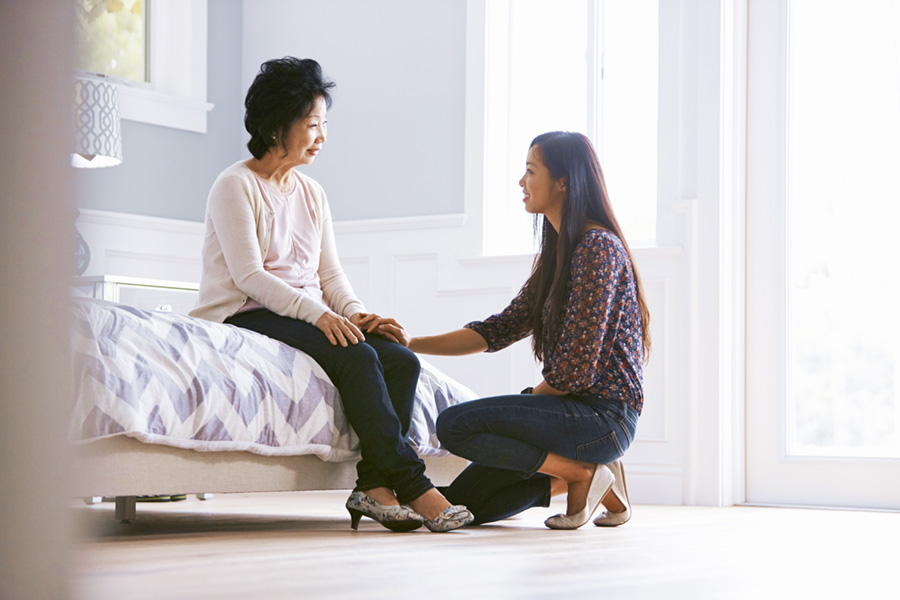
Ron Mori
A new study has found that two-thirds of adults report experiencing social isolation and high levels of anxiety since the beginning of the COVID-19 pandemic, according to “The Pandemic Effect: A Social Isolation Report,” a just-released study conducted by the AARP Foundation in collaboration with the United Health Foundation. The report notes that many of those affected have not turned to anyone for help, perhaps because many don’t have reliable social support networks.
Social isolation is a public health crisis. Social isolation is defined as an “absence of meaningful social relationships.” Studies have found the health risks of social isolation can be more harmful than obesity, and prolonged isolation is equivalent to smoking 15 cigarettes a day.

Adult Daughter Talking To Depressed Mother At Home
In a united effort to help those affected, the foundations recently expanded the website Connect2Affect.org, which was originally launched by the AARP Foundation in 2016. The site offers resources to address social isolation, including an assessment that individuals can take to find out if they or a loved one are at risk for social isolation and get guidance on how to strengthen their social bonds.
Negative Emotions
“The Pandemic Effect: A Social Isolation Report” found that for adults 50 and older who have experienced social isolation during the pandemic, half report feeling less motivated, more than four in 10 (41 percent) report feeling more anxious than usual and more than a third (37 percent) have felt depressed.
A third of women over age 50 reported going 1-3 months without interacting with people outside of their household or workplace, and adults with low and middle incomes who reported experiencing social isolation also said they feel more depressed than adults with higher incomes.
Furthermore, only 11 percent of adults, regardless of age, turned to a medical professional when feeling down or sad, and almost a third reported that they did not look to anyone for support.
Responding to the Crisis
Commander Scott Kelly, a renowned astronaut who spent 340 days isolated in space, has teamed up with the AARP Foundation and the United Health Foundation to spread the message about the seriousness of social isolation and provide tips on how to successfully emerge from it.
“Living on the International Space Station for nearly a year with literally no way to leave wasn’t easy, so I took precautions for my mental and physical health seriously,” said Kelly. “I’m advocating for individuals, particularly vulnerable older adults, to use available tools like Connect2Affect.org to strengthen their social connections.”
To get help, the Connect2Affect.org provides resources to help individuals assess their risk for social isolation, as well as find support services in their area. Helpful resources include:
- Social Isolation Risk Assessment — A questionnaire to help individuals determine how connected they are, and which resources would benefit them most.
- Connect2Affect Chatbot — Designed to provide friendly conversation with the goal of helping rebuild social connections. Chatbot conversations are secure, private and accessible 24/7.
“Social isolation is taking a toll on individuals and communities nationwide, and it’s especially pernicious for those who are 50 or older. This survey shows that older adults who have lower incomes and who are women are at greatest risk,” said Lisa Marsh Ryerson, president of the AARP Foundation. “The tools and resources at Connect2Affect.org are designed to help older adults build and maintain the social connections they need to thrive.”
Dr. Rhonda Randall, executive vp and chief medical officer at UnitedHealthcare, added, “Many people don’t know that social isolation can have lasting effects on not only mental health — but also physical health. We’re focused on finding practical solutions to the lack of connections, companionship and the sense of belonging that we all need as humans.”
Please continue to stay safe, and ask for help if you feel isolated and need assistance.
Ron Mori is a member of the Washington, D.C., JACL chapter and manager of community, states and national affairs — multicultural leadership for AARP.



